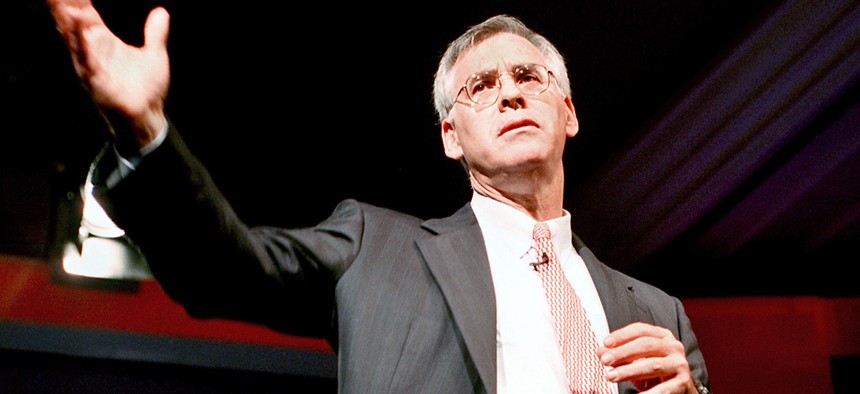Evaluate Aspiring Cyberwarriors Using Gaming, Not Grades

"Why recruit for cyber on the basis of college degrees and the like when, in fact, what we really care about are skills that don't really correlate with that?" Richard Danzig asked. Defense Department file photo
Former Navy Secretary wonders why federal recruitment focuses on formal education, when computer security positions require on-the-job learning.
Maybe the winner of an upcoming Pentagon contest to robotize cybersecurity should win a salaried job, in addition to the planned $2 million cash prize.
That's the belief of former Navy Secretary Richard Danzig, who questions why the government focuses so much on formal education when evaluating applicants for cyber positions.
At a time when computer security startups, social media networks and defense contractors are offering young talent six-figure salaries, many experts say the government must rejigger its cyber hiring process. There are currently about 340,000 job openings for cyber professionals by some estimates. Within the next few years, Defense Department officials will need 6,000 of those individuals, the FBI wants 2,000 and the Department of Homeland Security has already had difficulty filling just 1,000 positions.
"Why recruit for cyber on the basis of college degrees and the like when, in fact, what we really care about are skills that don't really correlate with that?" Danzig said. One way to attract more skilled personnel to the government might be "to create a recruitment process that's different from the traditional federal one," he added.
Danzig spoke at a Center for a New American Security event tied to the release of a new report on reducing the inherent national security risks of the Internet, which he wrote for the think tank.
"I don't know how anything in the government can compete with something like Silicon Valley for cybersecurity people," said Gary McGraw, chief technology officer for Cigital, a Virginia-based software security firm that began as a startup.
Danzig tossed out several ideas for reforming federal cyber hiring, including creating a Silicon Valley government office. Another option would be to use cyber competitions -- like the Pentagon's contest -- "as the method of recruitment,” he said.
The two-year Cyber Grand Challenge dares competitors to build a computer that is hacker repellant. The final match will take place at the Las Vegas DEF CON hacker conference in 2016. The Defense Advanced Research Projects Agency, or DARPA, is organizing the challenge.
Danzig pointed out that "a lot of cyber learning is OJT," or on-the-job training.
The man who runs the Grand Challenge contest said games aren't necessarily needed to excite talent about government work. DARPA Program Manager Mike Walker hails from startups and consultancies that probe systems for security holes.
"Being able to do something that actually makes a difference, in a field where a lot of times we're just doing compliance and check listing -- that’s a huge draw not to be underestimated," he said.






